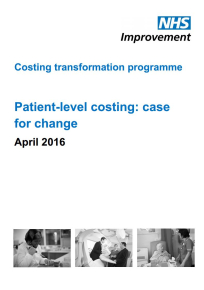News / NHS Improvement makes case for patient costing

NHS Improvement – which brought together Monitor and the Trust Development Authority from the beginning of April – issued a suite of documents to support its costing transformation programme.
These included the delayed Patient-level costing: case for change report, which asserts that the ‘national case for change is well understood and it is commonly accepted that need a better system’. It points at calls for improved data from various sources including the National Audit Office, the National Institute for Health and Care Excellence, the Carter report on NHS productivity and the Five-year forward view.
NHS Improvement has argued that the potential £5bn savings targeted in the Carter report can only be achieved ‘by having a detailed understanding of costs at the provider level’. ‘This requires investment,’ the report said. ‘PLICS (patient-level information and costing systems) is the process to identify where practices can be improved.'
The report has compiled a number of case studies to help providers make their own cases for investment locally. The case studies demonstrate where savings have been made by providers already producing patient-level costs. And the report also collates the arguments used by these organisations to win their own local business cases.
NHS Improvement believes that implementation and operational costs range from £138,000 to £288,000 per year, depending on organisational size. This could be offset by existing reference and service-line reporting costs. The costs include a costing team of between two and six whole time equivalents, software and the costs of using the data across an organisation.
NHS Improvement will also need to invest to put systems in place capable of collecting and analysing the far greater levels of detailed data that will be produced.
New costing standards for acute organisations have also been published. These remain non-mandatory and are initially targeted at the six acute trusts taking part in the CTP roadmap partner programme. However the standards will be phased in over the next few years – with a five-year timetable covering all sectors.
The first mandatory standards for acute providers will be published in January 2018 to cover the compilation of costs in the 2018/19 financial year – which would be collected in July 2019. The timetable would see mandatory standards published for the mental health and ambulance sectors in January 2019 (for 2019/20), with community providers joining a year later.
The standards underpin NHS Improvement’s new costing process and are broken into five groups:
- Costing principles (8)
- Information requirements (2)
- Costing processes (8)
- Costing methodologies (9)
- Costing approaches (5)
The process will see general ledger costs mapped to a cost ledger – providing a single format and starting point. A standard cost ledger will be included in the 2017 standards. The costs ledger is then translated into resources before these are mapped to activities. Activity drivers are then used to map each activity to cost objects – with each driver defined in the standards.
The HFMA also published a toolkit for acute services that aims to help organisations maximise the value of patient level cost data. The toolkit is available for members of the HFMA’s Healthcare Costing for Value Institute.
Related content
The Institute’s annual costing conference provides the NHS with the latest developments and guidance in NHS costing.
The value masterclass shares examples of organisations and systems that have pursued a value-driven approach and the results they have achieved.